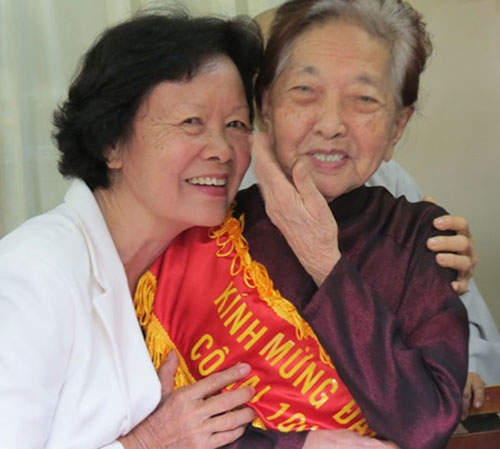VietNamNet Bridge – Ngo Thi Hai, one of the first three women who studied nursing in Viet Nam, celebrated her 100th birthday in HCM City last Sunday.

|
|
Le Thi Kim Anh hugs former colleague Ngo Thi Hai (right), one of the country's first professionally trained female nurses. — VNS Photo Gia Loc
|
Hai's house was full of laughter as her former students travelled far and wide to see her again.
Vo Thi Anh, one of the students, who lives 25 kilometres away from HCM City in the Mekong Delta province of Tien Giang, arrived a bit early.
"Whenever I come and visit her, a deep love rises in my heart, seeing her loneliness," she said. "We love Hai. She devoted her entire life to contributing to the city's health sector. She is like our mother because of her enthusiasm and her excellent teaching as well her compassion toward patients."
Hai no longer has any living relatives, and she has never had children. The house she lives in was lent to her without charge by a church in District 10.
Many of her former students give her money for her daily necessities.
Anh said that when her students were studying with Hai, they feared her strictness.
But that seriousness helped them become qualified nurses who continue to receive commendations from leaders of hospitals where they work, she said.
Anh's classmate, Nguyen Ngoc Lien, a nursing lecturer at Quang Trung Vocational School in Binh Tan District, said: "I consider Hai as a spiritual mother in the health sector. Taking her as a good model, I use what she taught me to guide my students with my whole heart like Hai did."
Another former student, Ton Thi Nam, said: "We have to thank her for her strictness. Because of it, we are able to do our tasks well. How good a teacher she was!"
Hai often told her students that, as nurses, they had to take care of patients with their entire heart, Nam said.
They should not browbeat patients but gently explain everything in detail, she added.
Hai also told the students to always be patient. When patients hit, the best way is to run. When they insult someone, the nurse should suffer silently and not get angry.
Hai explained that the patients' illnesses and frustrations often caused them to lash out, and that nurses should be deeply sympathetic to their problems.
"I experienced these things, including patients losing their temper and shouting or hitting me," she said. "But I was ready to forgive patients' bad behaviour. I still took care of them with love."
She added: "The patients' life is in the nurses' hands. If the nurses are careless for as little as three or five minutes, patients could die. Because of my love for my students, I was very strict with them. This was my professional responsibility and conscience."
Hai also said that ethics in the nursing profession was very important.
"This is the decisive factor in becoming a qualified nurse," she said.
Years ago in Viet Nam, only men studied nursing. But Hai told her father she wanted to be a nurse, so she applied to a newly opened French nursing school in what was then Saigon.
After being accepted, Hai, one of only three women at the school, learned about the importance of controlling patient infections through asepsis, which includes practices to prevent infection during surgery or in medicine in general.
In 1940, she graduated and began working at Lalung Bonnaire Hospital, now called Cho Ray Hospital.
Eleven years later, the hospital's managing director board began sending female nurses to study abroad after they decided to set up a nursing training school for women in Viet Nam.
Hai was one of the nurses selected. She studied in Canada at the L'Institut Marguerite-D'Youville in Montreal in a one-year training course.
Hai learned more about nutrition and asepsis there. Returning to Viet Nam, she taught classes, including proper nutrition for patients.
She recognised that asepsis was critically important and repeatedly emphasised its significance to her students.
At that time, Vietnamese nurses did not wear gloves when they handled patients with injuries. The control of hospital infections still was not given sufficient attention.
Pincers, scissors and cotton wool were placed together in boxes, leading to a risk of infection.
When Hai became a teaching adviser of nurses at Nguyen Tri Phuong Hospital, she began to separate the implements into small boxes.
"We cleverly applied theory to practice many times, thanks to what we were taught by Hai," Anh, Hai's former student, said. "Techniques to prevent infection and transmission of infections at hospitals are absolutely necessary for nurses."
Gia Loc
| related news |
VNS